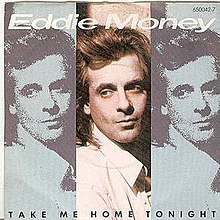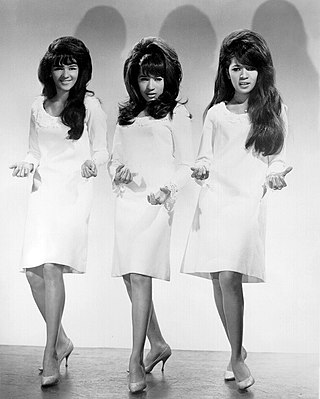
The Ronettes were an American girl group from Washington Heights, Manhattan, New York City. The group consisted of lead singer Veronica Bennett, her older sister Estelle Bennett, and their cousin Nedra Talley. They had sung together since they were teenagers, then known as "The Darling Sisters". Signed first by Colpix Records in 1961, they moved to Phil Spector's Philles Records in March 1963 and changed their name to "The Ronettes".

Edward Joseph Money was an American singer and songwriter who, in the 1970s and 1980s, had eleven Top 40 songs, including "Baby Hold On", "Two Tickets to Paradise", "Think I'm in Love", "Shakin'", "Take Me Home Tonight", "I Wanna Go Back", "Endless Nights", "Walk on Water", and "The Love in Your Eyes". Critic Neil Genzlinger of The New York Times called him a working-class rocker. In 1987, he was nominated for a Grammy Award for Best Male Rock Vocal Performance for "Take Me Home Tonight".

Ronnie Lee Milsap is an American country music singer and pianist.
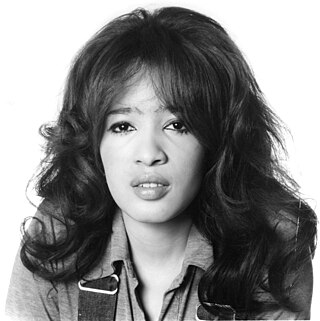
Veronica Yvette "Ronnie" Greenfield was an American singer who co-founded and fronted the girl group the Ronettes. She is sometimes referred to as the original "bad girl of rock and roll".

"You've Really Got a Hold on Me" is a song written by Smokey Robinson, which became a 1962 Top 10 hit single for the Miracles. One of the Miracles' most covered tunes, this million-selling song received a 1998 Grammy Hall of Fame Award. It has also been selected as one of The Rock and Roll Hall of Fame's 500 Songs that Shaped Rock and Roll. It was recorded by the Beatles for their second album, With the Beatles (1963). Many other musicians also recorded versions.
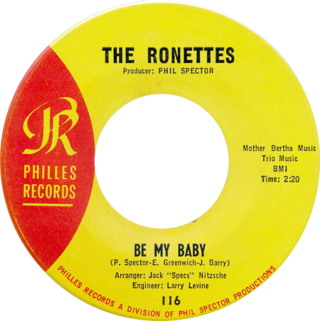
"Be My Baby" is a song by American girl group the Ronettes that was released as a single on Philles Records in August 1963. Written by Jeff Barry, Ellie Greenwich, and Phil Spector, the song was the Ronettes' biggest hit, reaching number 2 in the U.S. and number 4 in the UK. It is often ranked as among the best songs of the 1960s, and has been regarded by some publications as one of the greatest songs of all time.
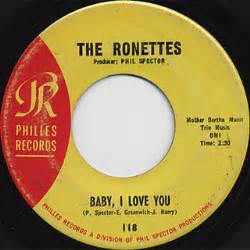
"Baby, I Love You" is a song originally recorded by the Ronettes in 1963 and released on their debut album Presenting the Fabulous Ronettes (1964). The song was written by Jeff Barry, Ellie Greenwich, and Phil Spector, and produced by Spector.
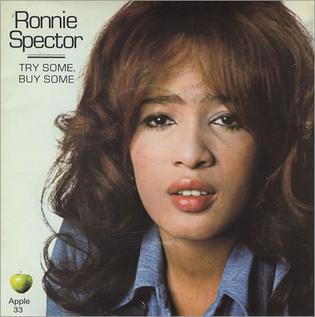
"Try Some, Buy Some" is a song written by English rock musician George Harrison that was first released in April 1971 as a single by American singer Ronnie Spector, formerly the lead vocalist of the Ronettes. She recorded it in London along with other Harrison compositions for a planned comeback album on the Beatles' Apple record label. The project was co-produced by Phil Spector, Ronnie's husband at the time, but abandoned following recording sessions that were hampered by his erratic behaviour. The only official release from the sessions, the single achieved minimal commercial success, peaking at number 77 on the US Billboard Hot 100 and number 63 on Canada's RPM Top 100. Harrison later added his own vocal onto a new mix of the instrumental track and included the song on his 1973 album Living in the Material World.
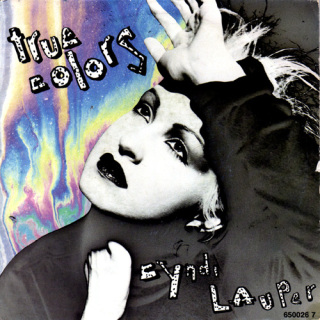
"True Colors" is a song written by American songwriters Billy Steinberg and Tom Kelly. It was both the title track and the first single released from American singer Cyndi Lauper's second studio album of the same name (1986). Released in mid-1986, the song would become a hit for Lauper, spending two weeks at number one on the US Billboard Hot 100, becoming her last single to occupy the top of the chart. It received a Grammy Award nomination for Best Female Pop Vocal Performance.

"I Can Hear Music" is a song written by Jeff Barry, Ellie Greenwich and Phil Spector for American girl group the Ronettes in 1966. This version spent one week on the Billboard Pop chart at number 100. In early 1969, the Beach Boys released a cover version as a single from their album 20/20 (1969), peaking at number 24 in the US.
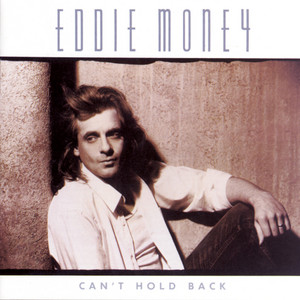
Can't Hold Back is Eddie Money's sixth album, released in 1986. It contains one of Money's biggest hits, "Take Me Home Tonight" which helped bring both himself and Ronnie Spector back to the spotlight. The album was certified platinum by the RIAA in August 1987.
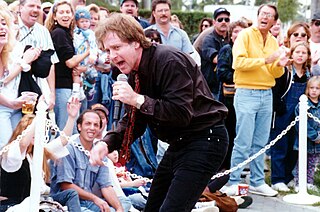
The discography of American rock musician Eddie Money consists of 11 studio albums, two live albums, four EPs, and 28 singles. He also released seven compilation albums.
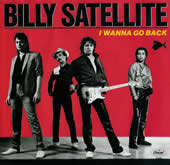
"I Wanna Go Back" is a 1984 song by American rock band Billy Satellite, written by band members Monty Byrom, Danny Chauncey, and Ira Walker, that achieved major popularity when recorded by Eddie Money in 1986. Another version was recorded by former Santana/Journey keyboardist/singer Gregg Rolie for his self-titled 1985 debut solo album.

"Say Goodbye to Hollywood" is a song written and performed by Billy Joel, first released in 1976 on his album Turnstiles as its opening track. It was originally released in the United States as the B-side to "I've Loved These Days" before being released as A-side in various countries like the UK, Germany and Australia in November 1976, with "Stop in Nevada" as the B-side. However, the song achieved greater recognition in 1981 when a live version from Songs in the Attic was released as a US single, with the live version of "Summer, Highland Falls" as a B-side. Joel wrote the song after moving back to New York City in 1975; he had previously relocated to Los Angeles in 1972 in an attempt to get out of an onerous record deal. The man who represents this song on the Turnstiles album is the man wearing sunglasses and holding a suitcase.

"(The Best Part of) Breakin' Up" is a song written by Phil Spector, Pete Andreoli and Vince Poncia. It was first recorded by the Ronettes, produced by Phil Spector and arranged by Jack Nitzsche with Ronnie Spector on lead vocals and with backing vocals by Nedra Talley and Estelle Bennett, ably abetted by Darlene Love and the Blossoms, Bobby Sheen, and Sonny & Cher. The song was released in April 1964, the year widely recognized as the group's most successful year, and proved to be the group's third consecutive top forty hit in the US. The single peaked at number 39 on the U.S. Billboard Hot 100 and number 43 on the UK Singles Chart.

"Is This What I Get for Loving You?" is a pop song written by Phil Spector, Carole King and Gerry Goffin and recorded by 1960s girl group The Ronettes. The song featured Ronettes lead singer Ronnie Spector on lead vocals, and Ronettes Nedra Talley and Estelle Bennett on backing vocals. Released on Philles Records, reaching No. 75 on the Billboard Hot 100 in 1965.
This article is a discography for American singing group The Ronettes. The Ronettes began recording with Colpix Records in 1961 and recorded eleven songs for Colpix. In March 1963, the group moved to Phil Spector's Philles Records, where they achieved their biggest success.
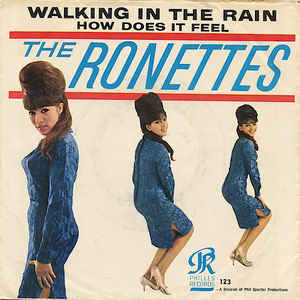
"Walking in the Rain" is a song written by Barry Mann, Phil Spector, and Cynthia Weil. It was originally recorded by the girl group the Ronettes in 1964 who had a charting hit with their version. Jay and the Americans released a charting hit cover of the song in 1969. The song has since been recorded by many other artists over the years, including the Walker Brothers.

Unfinished Business is the second studio album by American singer Ronnie Spector, released in 1987.

"Do I Love You?" is a song written by Phil Spector, Pete Andreoli and Vini Poncia. It was recorded by American girl group the Ronettes in 1964 and released on their debut album Presenting the Fabulous Ronettes.
